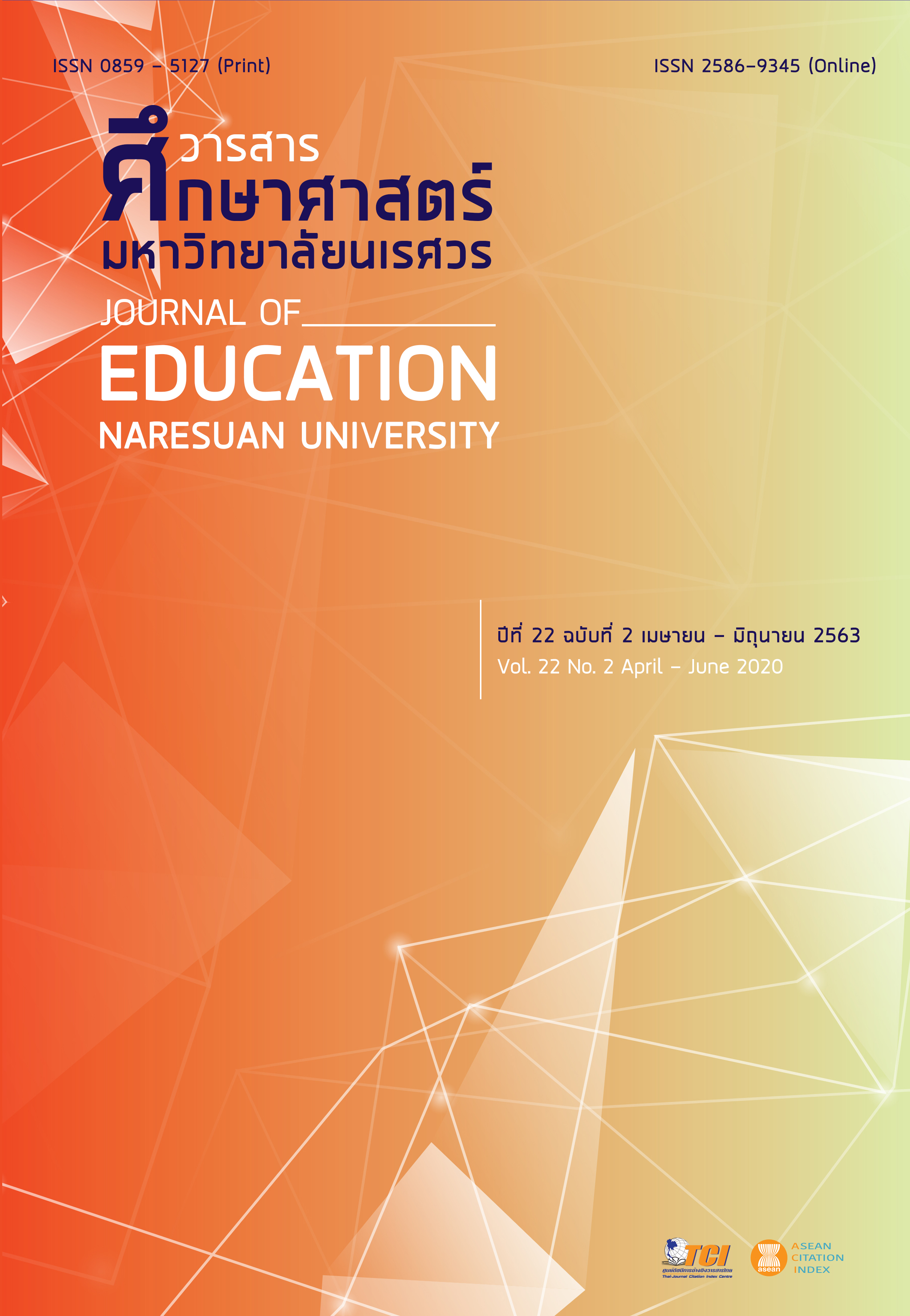FACTORS AFFECTHING BEING A LEARNING PERSON IN THE 21ST CENTURY OF STUDENTS AT NARESUAN UNIVERSITY
Main Article Content
Abstract
The purposes of this research were to 1) analyze the characteristics of a learning person in the 21st century of students at Naresuan University and 2) analyze a structural equation modeling of factors affecting being a learning person in the 21st century of students at Naresuan University. The samples of this study were 440 first year to fourth-year undergraduate students. They were selected by multi-stage random sampling. The research instrument was a questionnaire which was divided 1 copy into three sections. The reliability of the research instrument The 6 variables were predictive variables include motivation for achievement have a reliability .838 attitude towards learning .812 were self-confidence .869 learning and teaching activities that focus on learner-centered approach .906 parental support .891 and identifier include being a learning person in the 21st century have a reliability .982. The data were analyzed by using frequency, percentage, mean, standard deviation, simple correlation coefficient, second order confirmatory factor analysis, and structural equation modeling analysis. It was found that the characteristics of a learning person in the 21st century of students at Naresuan University were related to empirical data and construct validity. There were 5 characteristics and 26 indicators. The first characteristic was self-seeking which consisted of 5 indicators. The second characteristic was creative thinking and innovation which consisted of 5 indicators. The third characteristic was ethics which consisted of 6 indicators. The fourth characteristic was academic leadership and skills for learning and development which consisted of 9 indicators. The fifth characteristic was skills for information, media, technology know-how, and computer use which consisted of 1 indicator. They were statistically significant at .01. There were 4 factors affecting being a learning person of students at Naresuan University. These factors were learning and teaching activities that focus on learner-centered approach ( = 0.165), self-confidence (
= 0.104), attitude towards learning (
= 0.081), and motivation for achievement (
= 0.055), However, parental support did not lead to being a learning person in the 21st century of students at Naresuan University.
Article Details
The owner of the article does not copy or violate any of its copyright. If any copyright infringement occurs or prosecution, in any case, the Editorial Board is not involved in all the rights to the owner of the article to be performed.
References
Boonwon, D. (2009). Factors affecting creative thinking of Prathomsuksa 6 Students Under Suphan Buri Educational Service Area Office (Master thesis). Kanchanaburi: Kanchanaburi Rajabhat University. [in Thai]
Chanhom, N. (2012). Factors affecting the use of the internet by students case study the north eastern polytechnic vocational college (Master thesis). Ubon Ratchathani: North Eastern Ploytechnic Vocational College. [in Thai]
Kongviriyapisal, M. (2006). An analysis of relationship of causal factors influencing the first-year students’ self-directed learning readiness at Rajabhat Suan Dusit University (Master thesis). Bangkok: Srinakharinwirot University. [in Thai]
Kantanate, N. (2009). The canonical relation between the factors of intelligence and not intelligence and the ability in problem solving and mathematics creation idea of the students in Mathayom Suksa 3 under the Chiangrai Educational Services Area Office 3 (Master thesis). Chiangrai: Chiangrai Rajabhat University. [in Thai]
Moonsri, S. (2012). The factors influencing self-development of Mathayom Suksa 6 students under the Secondary Education Service Area Office 19 (Loei-Nong Bua Lamphu) (Master thesis). Maha Sarakham: Mahasarakham University. [in Thai]
Meechai, C. (2011). A study of factors affecting to self-development of the Eastern University of Management and Technology in Faculty Business Administration students. In the 23rd Technical Meeting (p. 7). Ubonratchathani: Eastern University of Management Technology. [in Thai]
Nookaew, P. (2003). The psycho factors related to student’s discipline behaviors in Rajabhat Institute Muban Chombung (Research report). Ratchaburi: Chombung Rajabhat University. [in Thai]
Prachanban, P. (2011). A development of the indicators of learning person characteristics of student in Naresuan University. Journal of Education Naresuan University, 13(1), 116-127. [in Thai]
Panwong, T. (2010). Factors influencing creative thinking of Mathayom Suksa 3 student (Master thesis). Ubon Rachathani: Ubon Rachathani Rajabhat University. [in Thai]
Panich, V. (2012). Way of learning for students in the 21st Century (3rd ed). Bangkok: Foundation of Sodsri-Slidwong. [in Thai]
Phimla, Y. (2013). Factors affecting to the attributes to pay attention to learning of students of secondary grade 11 under the Office of Secondary Education Service Area 33 (Master thesis). Maha Sarakham: Rajabhat Mahasarakham University. [in Thai]
Sriboonraung, S. (2007). A study of some factors related to self-directed learning readiness of the sophomore student in the area of public health of Thammasat University (Master thesis). Bangkok: Srinakharinwirot University. [in Thai]
Thaiyong, N. (2009). Psycho-social factors influencing self-improvement behaviors of the second class level student in Si Sa Ket Education Area 3 (Master thesis). Ubon Ratchathani: Ubon Ratchathani Rajabhat University. [in Thai]
Thongsee, S. (2013). The factors affecting information technology utilization of Mattayomsuksa three student in Petchabun Education Area 1: Multi level analysis (Master thesis). Phetchabun: Phetchabun Rajabhat University. [in Thai]


